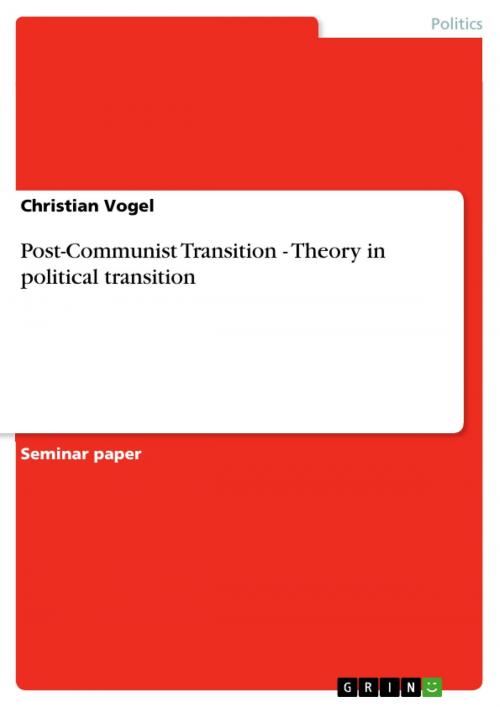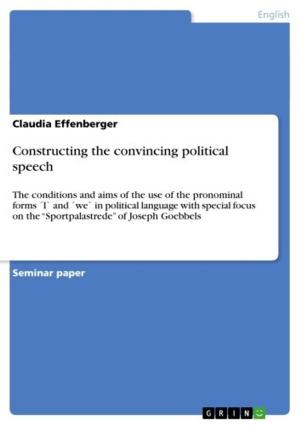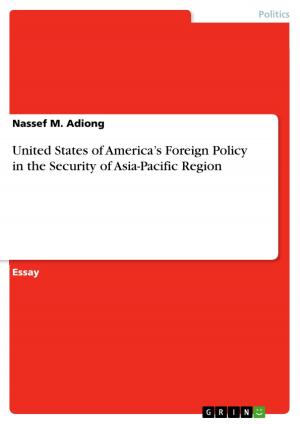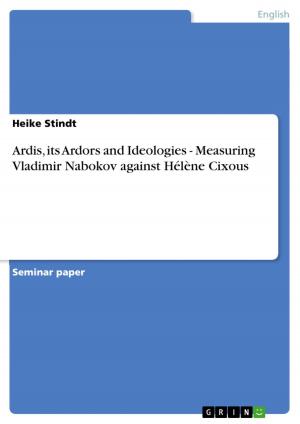Post-Communist Transition - Theory in political transition
Theory in political transition
Nonfiction, Social & Cultural Studies, Political Science, International, International Relations| Author: | Christian Vogel | ISBN: | 9783638755566 |
| Publisher: | GRIN Publishing | Publication: | June 8, 2007 |
| Imprint: | GRIN Publishing | Language: | English |
| Author: | Christian Vogel |
| ISBN: | 9783638755566 |
| Publisher: | GRIN Publishing |
| Publication: | June 8, 2007 |
| Imprint: | GRIN Publishing |
| Language: | English |
Seminar paper from the year 2005 in the subject Politics - International Politics - Region: Eastern Europe, grade: 1,0, University of Tartu (Center of Baltic Studies), course: Post-communist transition and Estonian experience, 16 entries in the bibliography, language: English, abstract: 1. Introduction 'Die EU braucht eine Pause zur Besinnung, zur Selbstfindung, zur Konsolidierung.' By proclaiming that the European Union (EU) needs a break for reflection and consolidation, Egon Bahr, who has been an intimate and consultant of the former German chancellor Willy Brandt as well as one of the most important German politicians as far as foreign policy is concerned, is pointing at a major problem of the before said institution. Since the EU enlargement of 10 new states has taken place at the 1st of May 2004, the problem which has been addressed before is even more up to date. Especially the recent argumentation about a common constitution, which is overdue to both providing a proper legal capacity as well as a capability to act, has been proofing that the EU is still far away from a strong, functioning political union. But how is it possible to create such a proper union consisting of 25 members, and most probably 27 by the year 2007, consisting of basically national states being still heavily occupied with dealing with their own backgrounds especially if one has a closer look the former communist states? Is there any strategy of the lowest common denominator of policy advice or do one have to identify the (communist) past in relation to present developments ? Facing this problem, the main purpose of this analysis will be an evaluation of different political transition theories and rating strategies which have been particularly taken into account by the former states behind the iron curtain. Finally this work is aiming at a probably existing connection between a successful political transition and a deeper integration into the European Union. For that reason the first part will give an overall view about the transition issue in general followed by the most relevant transition theories and methods of rating democratic stability thereby mainly focusing on political changes. Since the analysis is only concerning countries gathering the EU, the next part will deal with peculiarities regarding the main political criteria for entering the before mentioned union. The last part should provide a conclusion about the success resp. failure of the scrutinized theories as well as the ongoing European integration.
Seminar paper from the year 2005 in the subject Politics - International Politics - Region: Eastern Europe, grade: 1,0, University of Tartu (Center of Baltic Studies), course: Post-communist transition and Estonian experience, 16 entries in the bibliography, language: English, abstract: 1. Introduction 'Die EU braucht eine Pause zur Besinnung, zur Selbstfindung, zur Konsolidierung.' By proclaiming that the European Union (EU) needs a break for reflection and consolidation, Egon Bahr, who has been an intimate and consultant of the former German chancellor Willy Brandt as well as one of the most important German politicians as far as foreign policy is concerned, is pointing at a major problem of the before said institution. Since the EU enlargement of 10 new states has taken place at the 1st of May 2004, the problem which has been addressed before is even more up to date. Especially the recent argumentation about a common constitution, which is overdue to both providing a proper legal capacity as well as a capability to act, has been proofing that the EU is still far away from a strong, functioning political union. But how is it possible to create such a proper union consisting of 25 members, and most probably 27 by the year 2007, consisting of basically national states being still heavily occupied with dealing with their own backgrounds especially if one has a closer look the former communist states? Is there any strategy of the lowest common denominator of policy advice or do one have to identify the (communist) past in relation to present developments ? Facing this problem, the main purpose of this analysis will be an evaluation of different political transition theories and rating strategies which have been particularly taken into account by the former states behind the iron curtain. Finally this work is aiming at a probably existing connection between a successful political transition and a deeper integration into the European Union. For that reason the first part will give an overall view about the transition issue in general followed by the most relevant transition theories and methods of rating democratic stability thereby mainly focusing on political changes. Since the analysis is only concerning countries gathering the EU, the next part will deal with peculiarities regarding the main political criteria for entering the before mentioned union. The last part should provide a conclusion about the success resp. failure of the scrutinized theories as well as the ongoing European integration.















